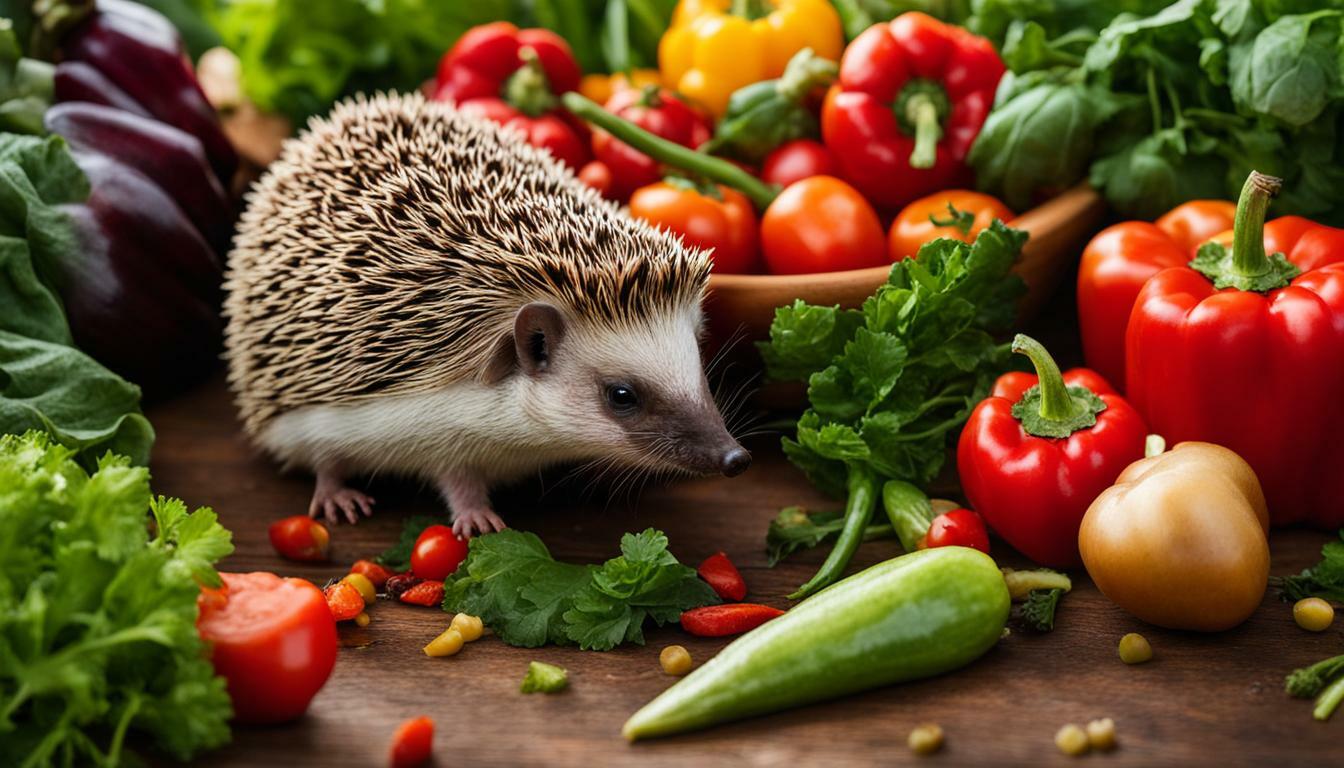Unveiling the Truth: Can Hedgehogs Eat Bell Peppers?
Hedgehogs are known for their unique diet, but can they safely consume bell peppers? In this article, we will explore the truth behind feeding bell peppers to hedgehogs and uncover whether it is a safe and beneficial addition to their diet.
Key Takeaways:
- Hedgehogs can eat bell peppers, but it is important to remove the stems, leaves, and seeds before serving.
- Bell peppers are low in calories and rich in vitamin C and antioxidants, which can provide health benefits to hedgehogs.
- The nutritional content of bell peppers includes vitamins, minerals, and fiber that support hedgehog growth and development.
- While bell peppers can be a nutritious addition to a hedgehog’s diet, there are potential risks, including allergies and intolerance. It is best to consult a veterinarian before introducing bell peppers to a hedgehog’s diet.
- Overall, bell peppers can be a safe and beneficial vegetable for hedgehogs when served in moderation and with proper preparation.
Can Hedgehogs Eat Bell Peppers?
Yes, hedgehogs can eat bell peppers! Discover why bell peppers can be a suitable addition to a hedgehog’s diet and how to serve them safely.
Bell peppers, also known as sweet peppers, come in different colors including green, yellow, orange, and red. Green bell peppers are unripe and have a bitter taste, while red bell peppers are the ripest. These vegetables belong to the same family as tomatoes and chili peppers.
Bell peppers are low in calories and rich in vitamin C and antioxidants, making them a healthy option for hedgehogs. They can be eaten raw or cooked. However, it is important to serve bell peppers to hedgehogs without the stems, leaves, and seeds.
Nutritional Content of Bell Peppers
Bell peppers contain a variety of essential nutrients that can benefit hedgehogs. In 100 grams of green bell pepper, according to the USDA nutrients database, you can find:
| Nutrient | Quantity |
|---|---|
| Water | 93.9 g |
| Energy | 20 kcal |
| Protein | 0.86 g |
| Fat | 0.17 g |
| Carbohydrate | 4.64 g |
| Fiber | 1.7 g |
| Sugar | 2.4 g |
| Calcium | 10 mg |
| Iron | 0.34 mg |
| Magnesium | 10 mg |
| Phosphorus | 20 mg |
| Sodium | 3 mg |
| Zinc | 0.13 mg |
| Copper | 0.066 mg |
| Manganese | 0.122 mg |
| Vitamin A | 370 IU |
| Vitamin B-6 | 0.224 mg |
| Vitamin C | 80.4 mg |
| Vitamin E | 0.37 mg |
| Vitamin K | 7.4 mcg |
| Thiamin | 0.057 mg |
| Riboflavin | 0.028 mg |
| Niacin | 0.48 mg |
Bell peppers are rich in vitamin C, which plays a crucial role in collagen production, boosting the immune system, and preventing diseases such as scurvy. They also contain vitamin A, essential for vision and overall immune system health. Additionally, bell peppers are a good source of vitamins B6, E, and K, as well as minerals like calcium and iron.
Feeding bell peppers to hedgehogs can provide various benefits, including improved cardiovascular health, protection against oxidative cell damage, and support for healthy bones and brain function. However, it is important to consider any potential risks or allergies before adding bell peppers to a hedgehog’s diet. If a hedgehog shows any negative reactions, it is best to consult a veterinarian to prevent further complications.
Benefits of Feeding Bell Peppers to Hedgehogs
Bell peppers offer numerous benefits for hedgehogs, as they are packed with essential nutrients that support their overall health and well-being. These colorful vegetables, available in green, yellow, orange, and red varieties, belong to the same family as tomatoes and chili peppers. Bell peppers are low in calories and rich in vitamin C and other antioxidants, making them a perfect addition to a hedgehog’s diet.
One of the key benefits of feeding bell peppers to hedgehogs is their high vitamin C content. Vitamin C plays a crucial role in hedgehog health, as it aids in the production of collagen for connective tissue formation, supports a healthy immune system, and acts as an antioxidant to neutralize free radicals in the body. By including bell peppers in their diet, hedgehogs can reduce the risk of diseases such as scurvy, which is caused by a vitamin C deficiency.
In addition to vitamin C, bell peppers contain other vital vitamins and minerals that contribute to a hedgehog’s well-being. They are a good source of vitamin A, which supports vision, growth, and immune system health. Bell peppers also provide vitamins B6 and E, which play roles in metabolism, blood vessel health, and immune system function. The presence of calcium in bell peppers helps hedgehogs develop and maintain strong bones, while the antioxidants found in these vegetables protect against oxidative cell damage and help prevent diseases such as diabetes, cardiovascular disease, cancer, and Alzheimer’s disease.
To further illustrate the nutritional content of bell peppers, the table below shows the nutrients found in 100 grams of green bell pepper, according to the USDA Nutrient Database:
| Nutrient | Quantity |
|---|---|
| Water | 93.9 g |
| Energy | 20 kcal |
| Protein | 0.86 g |
| Fat | 0.17 g |
| Carbohydrate | 4.64 g |
| Fiber | 1.7 g |
| Sugar | 2.4 g |
| Calcium | 10 mg |
| Iron | 0.34 mg |
| Magnesium | 10 mg |
| Phosphorus | 20 mg |
| Sodium | 3 mg |
| Zinc | 0.13 mg |
| Copper | 0.066 mg |
| Manganese | 0.122 mg |
| Vitamin A | 370 IU |
| Vitamin B-6 | 0.224 mg |
| Vitamin C | 80.4 mg |
| Vitamin E | 0.37 mg |
| Vitamin K | 7.4 mcg |
| Thiamin | 0.057 mg |
| Riboflavin | 0.028 mg |
| Niacin | 0.48 mg |
As you can see, bell peppers contain a wide range of nutrients that contribute to a hedgehog’s overall health and well-being. However, it’s important to note that while bell peppers are generally safe for hedgehogs to consume, some individuals may have allergies or intolerance to these vegetables. If you notice any adverse reactions after feeding bell peppers to your hedgehog, such as diarrhea, vomiting, or breathing problems, it’s best to consult a veterinarian to determine the cause and ensure the health and safety of your pet.
Nutritional Content of Bell Peppers
Bell peppers are not only tasty, but they are also a nutritional powerhouse, containing an array of vitamins, minerals, and antioxidants that can contribute to a hedgehog’s optimal health. Let’s take a closer look at the nutritional content of bell peppers.
Firstly, bell peppers are a great source of vitamin C, with 100 grams of green bell pepper containing about 80.4 mg of this essential nutrient. Vitamin C is important for hedgehogs as it plays a crucial role in the production of collagen for connective tissues, supports a healthy immune system, and acts as an antioxidant to protect against free radicals and prevent diseases.
In addition to vitamin C, bell peppers also contain other essential vitamins and minerals. Green bell peppers, for example, are rich in vitamin A, calcium, iron, and vitamin B6. Vitamin A is vital for hedgehogs as it contributes to good vision, supports a healthy immune system, and helps with cell communication and organ function. Calcium is essential for strong and healthy bones, while iron is necessary for oxygen transport in the body. Vitamin B6 aids in metabolism and protects the central nervous system.
| Nutrients | Quantity |
|---|---|
| Water | 93.9 g |
| Energy | 20 kcal |
| Protein | 0.86 g |
| Fat | 0.17 g |
| Carbohydrate | 4.64 g |
| Fiber | 1.7 g |
| Sugar | 2.4 g |
| Calcium | 10 mg |
| Iron | 0.34 mg |
| Magnesium | 10 mg |
| Phosphorus | 20 mg |
| Sodium | 3 mg |
| Zinc | 0.13 mg |
| Copper | 0.066 mg |
| Manganese | 0.122 mg |
| Vitamin A | 370 IU |
| Vitamin B-6 | 0.224 mg |
| Vitamin C | 80.4 mg |
| Vitamin E | 0.37 mg |
| Vitamin K | 7.4 |
| Thiamin | 0.057 mg |
| Riboflavin | 0.028 mg |
| Niacin | 0.48 mg |
These nutrients provide hedgehogs with a well-rounded diet and contribute to their overall health and well-being. However, it is important to note that while bell peppers are generally safe for hedgehogs, individual hedgehogs may have allergies or intolerances to certain foods. It is always best to consult with a veterinarian before introducing any new food into a hedgehog’s diet.
By including bell peppers in a hedgehog’s diet, it is possible to provide them with a variety of essential nutrients that can support their growth, immune system, bone health, and overall well-being.
Risks of Feeding Bell Peppers to Hedgehogs
While bell peppers can be a nutritious addition to a hedgehog’s diet, it is important to be aware of potential risks and consult a veterinarian to ensure the safety of your spiky companion.
Hedgehogs can consume bell peppers without issue, but there are a few things to consider. Some hedgehogs may be allergic to bell peppers or have an intolerance, which can lead to digestive issues such as diarrhea or vomiting. If your hedgehog shows any negative reactions after consuming bell peppers, it is best to seek immediate veterinary attention to prevent the situation from worsening.
Additionally, red and orange bell peppers contain higher amounts of sugar compared to green and yellow bell peppers. While the antioxidants in ripe bell peppers can provide health benefits, excessive sugar consumption can lead to weight gain and other health issues in hedgehogs. It is important to offer red and orange bell peppers only in small quantities and as an occasional treat.
| Risks of Feeding Bell Peppers to Hedgehogs | |
|---|---|
| Allergies or intolerance | Some hedgehogs may be allergic to bell peppers or have an intolerance, leading to digestive issues. |
| Excessive sugar consumption | Red and orange bell peppers contain higher amounts of sugar, which can lead to weight gain and other health issues if consumed in excess. |
In conclusion, while hedgehogs can eat bell peppers and derive nutritional benefits from them, it is important to be mindful of potential risks. Consult a veterinarian if you have any concerns or if your hedgehog shows any negative reactions after consuming bell peppers. Remember to offer red and orange bell peppers in moderation and as a treat, and always remove the stems, leaves, and seeds before serving.
Conclusion
In conclusion, bell peppers can be a safe and nutritious treat for hedgehogs, but it is crucial to offer them in moderation and monitor for any adverse reactions. Hedgehogs can eat all colors of bell peppers, but it is best to serve them without the stems, leaves, and seeds. The yellow and green bell peppers are low in sugar, making them a healthy option for hedgehogs. The red and orange bell peppers have higher amounts of antioxidants but also contain more sugar, so they should be fed in moderation.
Bell peppers provide numerous benefits for hedgehogs. They are rich in vitamin C, which is essential for collagen production, a healthy immune system, and the prevention of diseases like scurvy. They also contain vitamin A, which promotes good vision, a healthy immune system, and proper organ function. Bell peppers are also a good source of other vitamins and minerals, such as vitamin B6, vitamin E, folate, and calcium.
While bell peppers offer many benefits, there are some risks to consider. Some hedgehogs may be allergic to bell peppers or have an intolerance, which can lead to digestive issues or severe reactions. It is important to observe your hedgehog after introducing bell peppers to their diet and consult a veterinarian if you notice any negative symptoms. It is always best to consult a professional before making any significant changes to your hedgehog’s diet.
Additional Resources
- Safe Vegetables for Hedgehogs: A Comprehensive Guide
- Creating a Balanced Diet for Your Hedgehog
- Hedgehog Care and Nutrition: Expert Tips and Advice
| Nutrient | Quantity (per 100g of green bell pepper) |
|---|---|
| Water | 93.9g |
| Energy | 20 kcal |
| Protein | 0.86g |
| Fat | 0.17g |
| Carbohydrate | 4.64g |
| Fiber | 1.7g |
| Sugar | 2.4g |
| Calcium | 10mg |
| Iron | 0.34mg |
| Magnesium | 10mg |
| Phosphorus | 20mg |
| Sodium | 3mg |
| Zinc | 0.13mg |
| Copper | 0.066mg |
| Manganese | 0.122mg |
| Vitamin A | 370 IU |
| Vitamin B-6 | 0.224mg |
| Vitamin C | 80.4mg |
| Vitamin E | 0.37mg |
| Vitamin K | 7.4mcg |
| Thiamin | 0.057mg |
| Riboflavin | 0.028mg |
| Niacin | 0.48mg |
Additional Resources
For more information on hedgehog diets and safe vegetable choices, check out these helpful resources and references:
– The Hedgehog Welfare Society: This organization provides comprehensive information on hedgehog care, including diet and nutrition. Visit their website at www.hedgehogwelfare.org.
– Hedgehog Central: A popular online community and resource for hedgehog owners, Hedgehog Central offers helpful forums and articles on hedgehog care, including dietary guidelines. Check out their website at www.hedgehogcentral.com.
– The American Hedgehog Association: The American Hedgehog Association is dedicated to promoting the welfare of hedgehogs through education and outreach. Their website, www.hedgehogassociation.org, provides valuable information on hedgehog care, including dietary recommendations.
– “Hedgehogs as Pets: Your Complete Guide” by Andrew Dryden: This comprehensive guidebook covers all aspects of hedgehog care, including diet and nutrition. It offers valuable tips and advice for hedgehog owners. Available in print and ebook formats.
Remember, it’s important to consult with a veterinarian to ensure you are providing the best diet for your individual hedgehog’s needs. Stay informed and provide your hedgehog with a balanced diet to keep them happy and healthy!
FAQ
Q: Can hedgehogs eat bell peppers?
A: Yes, hedgehogs can eat bell peppers. It is advisable to serve bell peppers to hedgehogs without the stems, leaves, and seeds.
Q: What are the benefits of feeding bell peppers to hedgehogs?
A: Bell peppers are low in calories and rich in vitamin C and other antioxidants, which makes them a healthy addition to any diet. They also contain essential vitamins and minerals that promote hedgehog growth and development.
Q: What nutrients are found in bell peppers?
A: Bell peppers contain water, energy, protein, fat, carbohydrates, fiber, sugar, calcium, iron, magnesium, phosphorus, sodium, zinc, copper, manganese, vitamin A, vitamin B-6, vitamin C, vitamin E, vitamin K, thiamin, riboflavin, and niacin.
Q: Are there any risks involved in feeding bell peppers to hedgehogs?
A: Some hedgehogs may have allergies or intolerances to bell peppers, which can cause digestive issues or severe reactions. It is advisable to consult a veterinarian before adding bell peppers to a hedgehog’s diet.
Q: What is the conclusion regarding feeding bell peppers to hedgehogs?
A: Bell peppers are a nutritious addition to a hedgehog’s diet, providing essential vitamins and antioxidants. However, they should be served in moderation and any adverse reactions should be monitored.
Q: Where can I find additional resources on hedgehog diets and safe vegetable options?
A: For more information, you can refer to reputable sources such as hedgehog care websites or consult a veterinarian specialized in exotic pets.






